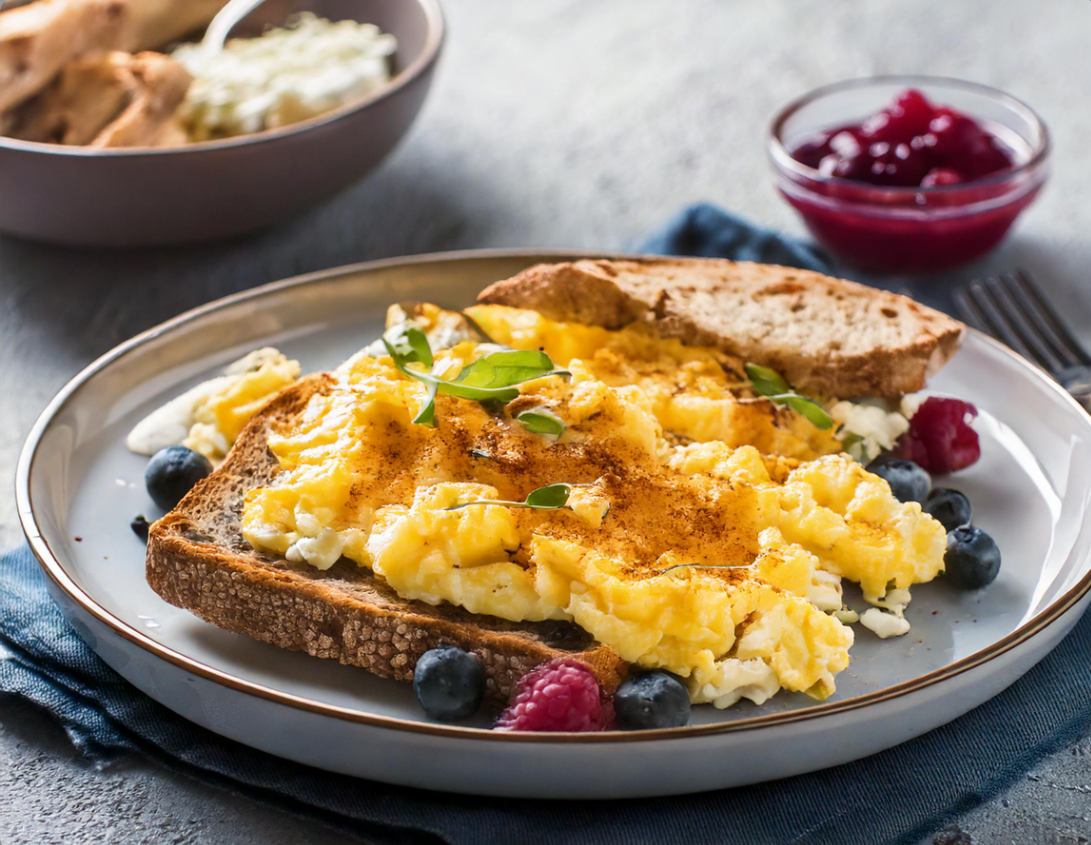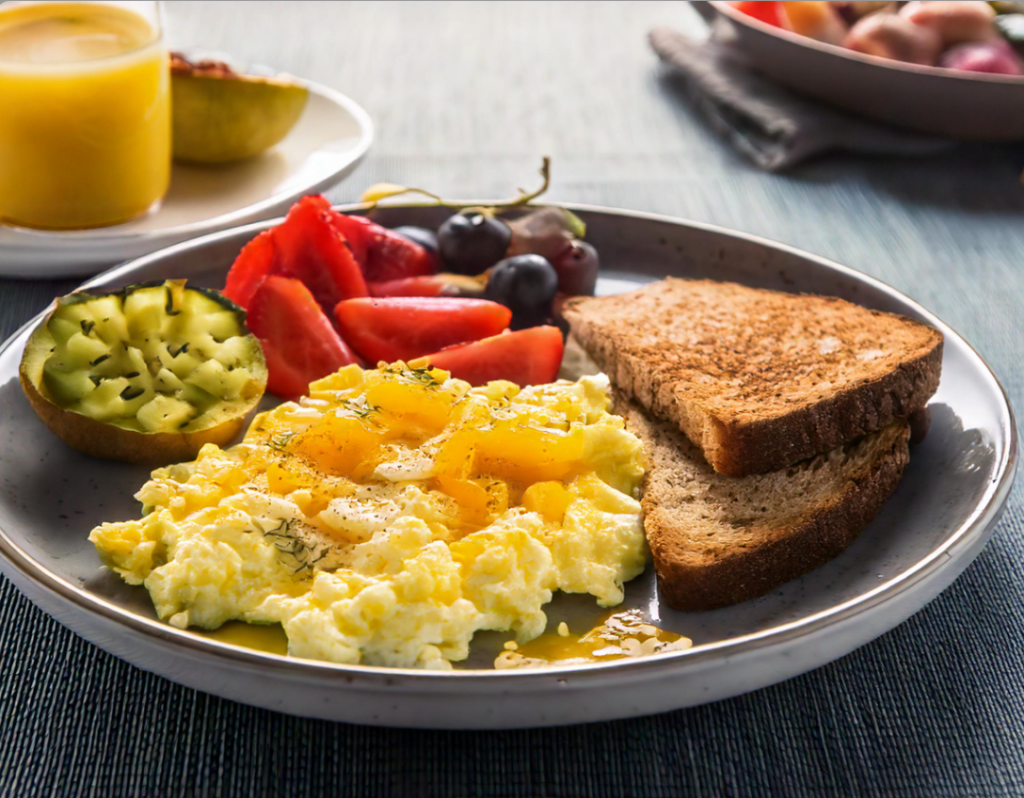Cottage cheese eggs are a delicious, protein-packed dish that combines the creaminess of cottage cheese with the rich, fluffy texture of scrambled eggs. This recipe has gained popularity for its simplicity, versatility, and nutritional benefits, making it a favorite among health-conscious food lovers and busy cooks alike.
Why Cottage Cheese Eggs Are So Popular
- Nutritional Powerhouse: This dish is high in protein, low in carbs, and packed with essential nutrients, making it ideal for those following keto, low-carb, or high-protein diets.
- Quick and Easy: Cottage cheese eggs can be prepared in under 10 minutes, making it a perfect breakfast or snack option for busy mornings.
- Customizable: The mild flavors of cottage cheese and eggs pair well with a variety of seasonings, vegetables, and toppings, allowing for endless variations.
- Great for Meal Prep: This recipe is easy to batch-cook, reheat, and enjoy throughout the week.
Whether you’re looking for a nutritious start to your day or a satisfying snack, cottage cheese eggs are a simple yet flavorful dish that’s sure to become a staple in your kitchen. Let’s dive into how to make this crowd-pleasing recipe!
Why Cottage Cheese and Eggs Make a Perfect Pair
High Protein Content
Cottage cheese and eggs are both protein-rich foods, making them a nutritional powerhouse when combined:
- Cottage Cheese: Offers approximately 14 grams of protein per half-cup, along with calcium and probiotics that support bone and gut health.
- Eggs: Provide about 6 grams of high-quality protein per large egg, along with essential vitamins like B12 and D.
- Together: This pairing delivers a satiating meal that supports muscle repair, energy levels, and overall wellness, making it ideal for fitness enthusiasts or those seeking balanced nutrition.
Creamy Texture and Rich Flavor
The combination of cottage cheese and eggs creates a luxurious dish with a satisfying texture:
- Creaminess: The natural creaminess of cottage cheese blends beautifully with the fluffy texture of scrambled eggs, creating a rich and velvety consistency.
- Enhanced Flavor: Cottage cheese adds a subtle tanginess to the eggs, elevating their flavor without overpowering the dish. Seasoning with herbs, spices, or a sprinkle of cheese enhances the dish further.
Quick and Easy to Make
Cottage cheese eggs are perfect for busy mornings or quick meal solutions:
- Minimal Prep: Requires only a handful of ingredients and basic cooking tools.
- Fast Cooking: The dish can be prepared in less than 10 minutes, making it a convenient option for breakfast, lunch, or even a light dinner.
- Versatility: Whether enjoyed plain or customized with vegetables, meats, or spices, cottage cheese eggs are a fuss-free way to create a satisfying, nutrient-dense meal.
The high protein content, creamy texture, and ease of preparation make cottage cheese and eggs a match made in culinary heaven, perfect for anyone seeking a delicious and nutritious dish.
Nutritional Benefits of Cottage Cheese Eggs
Health Benefits of Cottage Cheese
Cottage cheese is a nutrient-rich ingredient that offers a variety of health benefits:
- High Protein: Packed with casein protein, which digests slowly, keeping you full longer and supporting muscle repair and growth.
- Rich in Calcium: Supports strong bones, teeth, and overall skeletal health.
- Low in Fat: Opt for low-fat or fat-free varieties for a lighter option, or full-fat for added richness and energy.
- Probiotics: Certain types of cottage cheese contain probiotics, promoting a healthy gut microbiome and improved digestion.
Essential Nutrients in Eggs
Eggs are a nutritional powerhouse that complements the health benefits of cottage cheese:
- Complete Protein: Eggs provide all nine essential amino acids, making them an excellent source of complete protein.
- Rich in Vitamins: Loaded with vitamin D for bone health, vitamin B12 for energy production, and choline, which supports brain and liver function.
- Healthy Fats: Contain beneficial fats, including omega-3s in some varieties, which promote heart and brain health.
- Antioxidants: Eggs contain lutein and zeaxanthin, which help protect your eyes from age-related damage.
Together: A Nutritional Powerhouse
When combined, cottage cheese and eggs create a nutrient-dense dish that:
- Provides over 20 grams of protein per serving.
- Supports bone, muscle, and brain health with essential nutrients.
- Is low in carbs and versatile enough for various diets, including keto, low-carb, and high-protein plans.
Cottage cheese eggs are a delicious way to enjoy a balanced meal that fuels your body and keeps you energized throughout the day.
Ingredients for Cottage Cheese Eggs
Types of Cottage Cheese
Choosing the right cottage cheese can make a difference in flavor and texture:
- Full-Fat Cottage Cheese: Offers a creamier, richer texture and flavor, ideal for indulgent breakfasts.
- Low-Fat or Fat-Free Cottage Cheese: A lighter option with fewer calories, great for those seeking a lower-fat dish.
- Small Curd vs. Large Curd: Small curd blends more seamlessly into the eggs, while large curd provides more noticeable chunks for added texture.
- Salted or Unsalted: Opt for unsalted if you prefer to control the seasoning in your dish.
Best Eggs to Use
The quality of the eggs is key to achieving fluffy, flavorful results:
- Free-Range or Pasture-Raised Eggs: These typically have richer yolks and better flavor, making them an excellent choice for this recipe.
- Organic Eggs: For those looking for ethically sourced, chemical-free options.
- Fresh Eggs: Ensure freshness for the best texture and taste by checking the sell-by date or performing the water test (fresh eggs sink in water).
Optional Add-Ons (Herbs, Vegetables, etc.)
Customize your cottage cheese eggs with these flavorful and nutritious add-ons:
- Herbs:
- Chives, parsley, basil, or dill for a fresh, aromatic touch.
- Vegetables:
- Spinach, diced tomatoes, bell peppers, or mushrooms for added nutrition and color.
- Cheese:
- Sprinkle shredded cheddar, Parmesan, or feta for extra creaminess.
- Protein Boost:
- Add cooked bacon, ham, or smoked salmon for a heartier meal.
- Spices and Seasonings:
- Black pepper, paprika, garlic powder, or a dash of hot sauce to enhance flavor.
With these ingredient options, you can tailor cottage cheese eggs to your taste preferences and dietary needs, ensuring a dish that’s as satisfying as it is versatile.
Step-by-Step Recipe Guide
Prepping the Ingredients
- Gather Your Ingredients:
- 2-3 large eggs (adjust based on serving size).
- ¼ cup of cottage cheese (small or large curd, your preference).
- Salt and pepper to taste.
- Optional add-ons like herbs, vegetables, or shredded cheese.
- Prepare Add-Ons:
- Chop herbs, dice vegetables, or shred cheese before you start cooking to ensure smooth preparation.
Cooking Techniques for Creamy Eggs
- Whisk the Eggs:
- In a bowl, whisk the eggs thoroughly until the whites and yolks are fully combined. This helps achieve a uniform texture.
- Heat the Pan:
- Use a non-stick skillet or frying pan over low to medium heat.
- Add a small amount of butter or oil to coat the pan lightly and prevent sticking.
- Cook Gently:
- Pour the whisked eggs into the heated pan and let them set slightly before stirring.
- Use a spatula to gently push the eggs from the edges to the center, creating soft folds.
Combining Cottage Cheese and Eggs
- Add Cottage Cheese:
- Once the eggs are partially set but still slightly runny, add the cottage cheese.
- Gently fold the cottage cheese into the eggs, ensuring even distribution.
- Finish Cooking:
- Continue cooking over low heat until the eggs are just set and creamy. Avoid overcooking to maintain the soft texture.
- Season to Taste:
- Add salt, pepper, and any additional spices or herbs before serving.
Serving Suggestions
Cottage cheese eggs pair beautifully with a variety of sides:
- Pair with Spicy Salmon Bowl for a hearty brunch.
- Serve alongside fresh fruits or whole-grain bread.
- Use as a filling in wraps or sandwiches for a portable meal.
Explore More Delicious and Healthy Recipes
- Gluten-Free Meatloaf: Pair this complementary recipe with your cottage cheese eggs for a hearty, well-rounded meal.
- Blackened Baked Salmon Bites: A flavorful option for a protein-packed lunch or dinner.
- Best Chewy Chocolate Chip Cookies Recipe: Indulge in this sweet treat to balance your day with a touch of dessert.
- Din Tai Fung Cucumber Salad Recipe: A light and refreshing appetizer to complete your meal plan.
These recipes are perfect for creating a balanced day of healthy and satisfying meals!
Using as a Filling for Wraps or Sandwiches
Transform cottage cheese eggs into a portable, satisfying meal:
- Wraps: Use as a filling in a whole-grain tortilla or low-carb wrap, adding spinach, tomatoes, or hot sauce for extra flavor.
- Sandwiches: Layer the eggs between slices of toasted bread with lettuce, avocado, and bacon for a protein-packed breakfast sandwich.
By following these steps and serving ideas, you’ll enjoy cottage cheese eggs as a versatile dish that’s perfect for any meal or snack.
 Variations on the Recipe
Variations on the Recipe
Low-Carb and Keto-Friendly Options
Cottage cheese eggs are naturally low in carbs, but you can further customize them to fit low-carb or keto diets:
- Extra Protein: Add cooked bacon, sausage, or smoked salmon for additional healthy fats and protein.
- Vegetable Add-Ins: Stir in keto-friendly vegetables like spinach, mushrooms, or zucchini for added nutrients without increasing carbs.
- Cheese Alternatives: Replace cottage cheese with cream cheese or mascarpone for a richer, keto-friendly variation.
Adding Spices or Sauces for Flavor
Elevate the flavor profile of your cottage cheese eggs with bold seasonings and sauces:
- Spices:
- Add paprika, chili powder, or turmeric for warmth and depth.
- Sprinkle a pinch of smoked salt or everything bagel seasoning for a unique twist.
- Fresh Herbs:
- Use chives, dill, or parsley for a fresh and aromatic touch.
- Sauces:
- Drizzle hot sauce, sriracha, or a dash of soy sauce for a flavorful kick.
- Add a spoonful of pesto or salsa for a fresh and zesty twist.
Dairy-Free Alternatives
For those avoiding dairy, you can still enjoy the creamy texture of cottage cheese eggs with these substitutions:
- Tofu Scramble: Replace eggs with crumbled tofu and use a plant-based cream cheese or unsweetened almond yogurt for creaminess.
- Coconut Milk: Stir in a tablespoon of coconut cream or milk for a dairy-free, silky texture.
- Nutritional Yeast: Sprinkle in nutritional yeast for a cheesy flavor without dairy.
Common Mistakes and How to Avoid Them
Avoiding Overcooked Eggs
Overcooked eggs can turn rubbery and lose their creamy texture. Here’s how to avoid this:
- Low and Slow: Cook eggs on low to medium heat and avoid rushing the process.
- Monitor Closely: Stir gently and frequently to ensure even cooking and prevent the eggs from drying out.
- Remove from Heat Early: Take the pan off the heat when the eggs are slightly undercooked; they will continue cooking from residual heat.
Choosing the Right Cottage Cheese
Not all cottage cheese is created equal, and choosing the right type ensures the best results:
- Small Curd for Smooth Texture: Small curd cottage cheese blends better with eggs, creating a cohesive dish.
- Full-Fat for Richness: For a creamier texture and fuller flavor, opt for full-fat cottage cheese.
- Fresh Cottage Cheese: Ensure the cottage cheese is fresh and free of sourness, as this can affect the overall taste of the dish.
By avoiding these common mistakes, you’ll consistently create cottage cheese eggs that are creamy, flavorful, and perfectly cooked every time.
Frequently Asked Questions
Can I Use Low-Fat Cottage Cheese?
Yes, low-fat cottage cheese works well in this recipe:
- Texture: While not as rich as full-fat cottage cheese, low-fat options still blend well with eggs.
- Flavor: The taste remains mild and creamy, complementing the eggs without overpowering them.
- Health Benefits: It’s a lighter option, ideal for those looking to reduce fat intake while maintaining a high protein content.
Does Cottage Cheese Taste Good with Eggs?
Absolutely! Cottage cheese enhances scrambled eggs with its creamy texture and subtle tang:
- Flavor Pairing: The mild, slightly salty flavor of cottage cheese balances the richness of eggs.
- Texture Improvement: It adds creaminess and moisture, making the eggs softer and more luxurious.
Why Are My Cottage Cheese Eggs So Watery?
Watery eggs can result from excess moisture in the cottage cheese. Here’s how to avoid it:
- Drain Excess Liquid: If the cottage cheese seems watery, strain it slightly before adding it to the eggs.
- Add Gradually: Stir in cottage cheese when the eggs are partially set to prevent excess liquid from pooling.
- Control Heat: Cook on low to medium heat to allow for even cooking and proper texture development.
What Does Gordon Ramsay Put in His Scrambled Eggs?
Gordon Ramsay’s scrambled eggs are famous for their creamy texture, achieved with simple ingredients:
- Eggs and Butter: Ramsay uses high-quality eggs and butter as the base.
- Crème Fraîche: He incorporates crème fraîche for added creaminess and tang, similar to the effect of cottage cheese.
- Seasoning at the End: Ramsay seasons his eggs only after they’re cooked to preserve their soft texture.
What Does Cottage Cheese Mix Well With?
Cottage cheese is incredibly versatile and pairs well with both savory and sweet ingredients:
- Savory: Mix with chopped herbs, avocado, or roasted vegetables for a hearty snack or meal.
- Sweet: Combine with fresh fruit, honey, or cinnamon for a protein-packed dessert or breakfast.
- Grains: Pair with rice, quinoa, or pasta for a creamy and filling dish.
- Spreads: Use as a spread on toast or crackers, topped with tomatoes or smoked salmon.
These answers cover common questions and tips, ensuring your cottage cheese eggs turn out perfectly and providing inspiration for other cottage cheese pairings!
Conclusion
Cottage cheese eggs are a simple yet versatile dish that combines the best of nutrition, flavor, and convenience. With their creamy texture, high protein content, and adaptability to various diets, they’re perfect for busy mornings, meal prep, or a satisfying snack.
Final Tips:
- Choose Quality Ingredients: Use fresh eggs and cottage cheese for the best flavor and texture. Opt for small curd cottage cheese for a smoother blend.
- Cook Gently: Low and slow cooking ensures soft, fluffy eggs without overcooking or drying them out.
- Customize with Add-Ons: Experiment with herbs, spices, vegetables, or cheeses to create variations that suit your taste.
- Balance Texture: Drain excess liquid from the cottage cheese if needed and incorporate it gradually into the eggs for a cohesive dish.
By following these tips, you’ll consistently create delicious, creamy eggs that elevate your breakfast game or provide a quick, nutritious meal. Enjoy experimenting with flavors and making this dish your own! 🥚🧀✨



